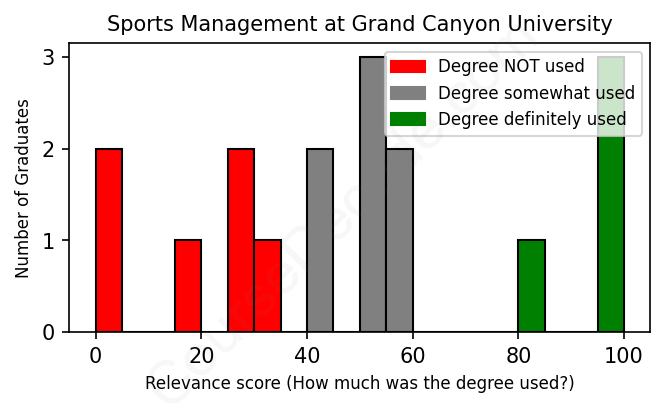
First, some facts. Of the Sports Management graduates from Grand Canyon University we've analyzed , here's how many have used (or NOT used) their degree in their career:

These are estimates based on AI analysis of 17 LinkedIn profiles (see below).
The verdict? Significantly below average. Overall, with an average relevance score of 48%, Sports Management graduates from Grand Canyon University have a much lower likelihood (-19%) of finding work in this field compared to the average graduate across all fields:
And for comparison, here's the chart for all profiles we've looked at across all degrees.
Also, after graduating, only 29% of these graduates have pursued further education other than another Bachelor's degree (such as a Masters degree or other), compared to the average across all profiles of 35%. This suggests a Bachelors degree is enough for most Sports Management graduates, and it's normal to look for work straight after graduation.
See the details:
|
Relevance score: 3% We think this person has NOT gone into a career related to their degree. We think this person has NOT gone into a career related to their degree.
DEGREE INFOGraduated in 2016 from Grand Canyon University with a Bachelor of Science (B.S.) in Sports Management. No other secondary education since. JOB HISTORY SINCE GRADUATIONSales Manager AMP Smart. Aug 2016 - Aug 2018 Senior Service Advocate  Farmers Insurance Aug 2018 - Dec 2019 Claims Adjuster  Farmers Insurance Dec 2019 - May 2021 Solar Consultant  Apricot Solar May 2021 - Dec 2021 Chief Financial Officer  Solfinity Power Dec 2021 - Nov 2023 Claims Specialist  State Farm Oct 2023 - Present ABOUTCustomer Service Advocate that looks to educate customers on insurance and service needs in a timely fashion. |
The top 10 most common jobs done by the graduates we've analyzed (ranked most common to least) are:
From the data gathered, it seems that many graduates from Grand Canyon University with degrees in Sports Management have primarily pursued roles that are directly related to coaching and event management within sports. Positions like Assistant Coaches at various high schools and colleges, as well as roles related to event operations at sports venues, show a strong connection to the skills and knowledge gained from their degree. For example, jobs like Varsity Defensive Coordinator and Event Management Coordinator clearly utilize and require insights from Sports Management, making them highly relevant and advantageous for those graduates.
However, it's also notable that some graduates have taken on roles that don't align well with their education in Sports Management. Positions like Warehouse Manager, Sales Manager, and even some customer service roles in non-sports settings suggest that not all graduates found opportunities that directly correspond with their field of study. In fact, a considerable number of the jobs—like being a Claims Adjuster or a Digital Service Consultant—do not require any background in sports management at all. So, while there are definitely common paths in coaching and event management, there's also a significant portion of graduates who have branched into unrelated fields, demonstrating a mixed picture regarding the job relevance to their Sports Management degree.
Here is a visual representation of the most common words in job titles for Sports Management graduates (this is across all Sports Management graduates we've analyzed, not just those who went to Grand Canyon University):

When you look at the career trajectories of graduates from Grand Canyon University with degrees in Sports Management, it seems like they start off in a mix of roles, but many tend to gravitate toward positions that are somewhat related to sports or athletics. For those fresh out of college, the first jobs often include coaching positions, internship roles in sports operations, or even entry-level sales related to sports teams. For example, graduates from 2015 started as video coordinators or assistant coaches, which is pretty typical for those looking to get into the sports field right away. However, you do see some who take detours into unrelated fields like sales or management positions in non-sports-related companies.
Fast forward five or ten years, and the picture starts to vary. Some graduates remain deeply entrenched in sports management roles, like coaching at high school or collegiate levels, or working in operations with professional teams. Others, however, have explored careers outside sports altogether, landing jobs in insurance or even as sales managers. While there are success stories—like those who have climbed the ranks at professional sports organizations—there are also graduates who’ve found themselves in jobs completely unrelated to their degrees. Overall, it seems like the job landscape is mixed; while many have found fulfilling roles that use their sports management education, a good number have ventured into other fields, which may leave some wondering about the direct applicability of their degrees post-graduation. It's a bit of a split, really, but with effort and the right networking, many can still thrive in their chosen sport-related careers.
Getting a Bachelor’s degree in Sports Management is generally pretty manageable, especially if you're passionate about sports and enjoy learning about the business side of things. At schools like Grand Canyon University, you can expect a mix of fun classes focused on sports marketing, event management, and facility operations. While it does require some hard work and dedication—especially when it comes to group projects and practical experience—it’s not usually considered one of the tougher degrees. If you keep up with your assignments and stay engaged, you’ll likely find it to be an enjoyable and rewarding experience!
Most commonly, in the LinkedIn profiles we've looked at, it takes people 4 years to finish a Bachelor degree in Sports Management.
Based on the job histories of these Grand Canyon University Sports Management graduates, it looks like they're starting off with some decent roles, but many may not be raking in the big bucks just yet. For instance, positions like "Warehouse Manager" or "Assistant Coach" generally don't pay as high as corporate roles, and while some like the "Chief Financial Officer" and "Project Manager" roles show potential for better salaries, it seems a lot of these positions are more entry-level or mid-tier. Those involved in sports coaching and ticket operations might find their salaries more variable and often lower compared to corporate jobs. Overall, it's a mix—some might be doing alright, but many others might still be working their way up the ladder.
Here is a visual representation of the most common words seen in the "about" section of LinkedIn profiles who have a Bachelor degree in Sports Management (this is across all Sports Management graduates we've analyzed, not just those who went to Grand Canyon University). This may or may not be useful:

Here are all colleges offering a Bachelor degree in Sports Management (ordered by the average relevance score of their Sports Management graduates, best to worst) where we have analyzed at least 10 of their graduates: